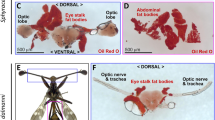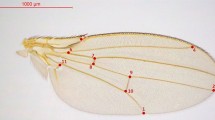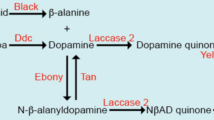Abstract
DURING studies of wing length and diapause of Gerris odontogaster (Zett.) (Heteroptera, Gerridae), I claimed1 an intimate correlation between the micropterous and nondiapause conditions and the macropterous and diapause conditions respectively, in pre-overwintering populations. I also summarised the general determination of wing lengths and diapause (Fig. 1), and later a macropter with fully developed eggs was collected from a dimorphic population.
This is a preview of subscription content, access via your institution
Access options
Subscribe to this journal
Receive 51 print issues and online access
$199.00 per year
only $3.90 per issue
Buy this article
- Purchase on Springer Link
- Instant access to full article PDF
Prices may be subject to local taxes which are calculated during checkout
Similar content being viewed by others
References
Vepsäläinen, K., Ann. Acad. Sci. fenn., A, IV, 183, 1 (1971).
Tauber, M. J., and Tauber, C. A., Nature, 244, 296 (1973).
Author information
Authors and Affiliations
Rights and permissions
About this article
Cite this article
VEPSÄLÄINEN, K. Lengthening of Illumination Period is a Factor in Averting Diapause. Nature 247, 385–386 (1974). https://doi.org/10.1038/247385a0
Received:
Issue Date:
DOI: https://doi.org/10.1038/247385a0
This article is cited by
-
Responsiveness to photoperiodic changes in the circannual rhythm of the varied carpet beetle, Anthrenus verbasci
Journal of Comparative Physiology A (2009)
-
Two critical day lengths for the determination of wing forms and the induction of adult diapause in the water strider,Aquarius paludum
Naturwissenschaften (1993)
Comments
By submitting a comment you agree to abide by our Terms and Community Guidelines. If you find something abusive or that does not comply with our terms or guidelines please flag it as inappropriate.



